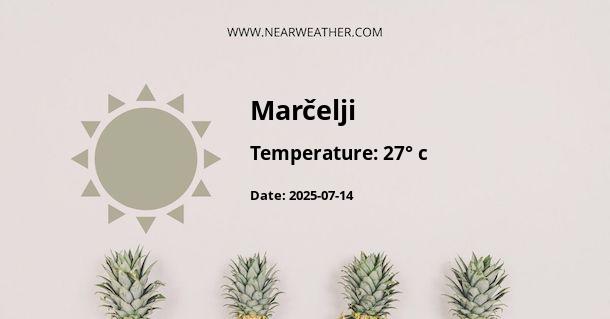Introduction to the Climate of Marcelji, Croatia
Marcelji is a small village located in the Primorje-Gorski Kotar County of Croatia, a region known for its diverse climatic conditions. Its proximity to both the Adriatic Sea and mountainous terrain influences Marcelji's weather, offering residents and visitors a unique climate experience throughout the year. Understanding the climate and weather patterns of Marcelji is crucial for agricultural planning, tourism, and daily living.
Climatic Zones and Influences
The climate in Marcelji can be classified as a mix between a humid subtropical climate (Cfa according to the Köppen climate classification) and a warm-summer Mediterranean climate (Csb), due to its location and elevation. This results in warm, humid summers and cool, wet winters, with a transitional period during spring and fall that typically brings mild and pleasant weather. The Adriatic Sea moderates the temperatures, preventing extremes, while the nearby Gorski Kotar mountain range can lead to orographic precipitation, thus contributing to the overall precipitation levels in the area.
Temperature Patterns
Temperature patterns in Marcelji are characterized by mild to warm summers with average high temperatures ranging between 22°C to 28°C (72°F to 82°F), while winters see averages from 2°C to 7°C (36°F to 45°F). However, it's not uncommon for winter temperatures to dip below freezing, especially during the night or during cold fronts.
Summer (June - August)
- Peak daytime temperatures can reach the high 20s to low 30s°C (mid-80s°F).
- Nighttime temperatures are typically cooler, offering respite from the heat.
Winter (December - February)
- Daytime temperatures hover around the low single digits in °C (30s°F).
- Nighttime can see temperatures drop below 0°C (32°F), leading to frost.
Spring and Autumn
- Spring sees a gradual increase in temperature, with late spring resembling early summer conditions.
- Autumn experiences a decrease in temperature, with conditions remaining mild until late autumn.
Precipitation and Humidity
Marcelji receives ample rainfall distributed throughout the year, with a slight peak in the autumn and winter months. The average annual precipitation is approximately 1,500mm (59 inches), ensuring lush vegetation and water supply for the region.
Rainfall
- Autumn and winter months can bring intense rainfall events.
- Spring generally sees moderate rainfall.
- Summer tends to be the driest period, yet occasional thunderstorms can occur.
Humidity
- Humidity levels in Marcelji are generally high due to the nearby sea, contributing to a feeling of warmth in summer and chilliness in winter.
- Summer evenings can feel muggy, resulting in the need for climate control in indoor environments.
Wind Patterns
Wind patterns in the region can be quite pronounced, especially with the presence of local wind phenomena such as the "bura" and the "jugo."
- Bura: A cold, northeasterly wind that can bring clear skies but dramatically lower temperatures and even snow in the winter.
- Jugo: A southeasterly wind usually associated with rain and storms, especially during the transition between seasons.
Climate Data Table
| Month | Average High (°C) | Average Low (°C) | Precipitation (mm) |
|---|---|---|---|
| January | 6 | 1 | 137.2 |
| February | 7 | 1 | 135.6 |
| March | 11 | 4 | 137.9 |
| April | 15 | 8 | 128.4 |
| May | 21 | 12 | 119.4 |
| June | 24 | 16 | 104.2 |
| July | 27 | 18 | 86.3 |
| August | 27 | 17 | 95.6 |
| September | 23 | 14 | 140.4 |
| October | 18 | 10 | 167.3 |
| November | 12 | 6 | 185.4 |
| December | 7 | 2 | 172.3 |
Source: Marcelji Meteorological Station (data averaged over the past 10 years)
Climate Change Effects
The impacts of climate change are not lost on this region, with an observed increase in temperature and changes in precipitation patterns impacting the local climate over recent decades. Increased frequency of extreme weather, such as severe storms and heatwaves, has been noted by local meteorological experts, stressing the importance of adaptation and resilience planning for the area's infrastructure and agriculture.
- Rising average temperatures could lead to more frequent heatwaves and drought conditions, impacting water resources and agriculture.
- Weather extremes may lead to more intense rainfall events, raising the risk of flooding.
- Altered wind patterns can affect the local microclimates and ecosystems.
Seasonal Recommendations
For travelers looking to visit Marcelji, understanding the seasonal climate is key to enjoying what the region has to offer:
- Summer: Ideal for coastal activities with plenty of sunny days. However, be prepared for the occasional thunderstorm.
- Winter: Cooler and wetter, suitable for experiencing local indoor cultural events and tasting the Croatian cuisine, with the potential for snow adventure in nearby mountains.
- Spring and Autumn: Perfect for hiking and outdoor exploration amidst mild weather and the region's natural beauty.
Expert Opinions
Climate experts agree that mitigation and adaptation strategies are vital for Marcelji's long-term climate resiliency. Recommendations include investing in sustainable infrastructure, enhancing water conservation methods, and supporting ecological agriculture practices to sustain local food production amidst changing climate conditions.
Final Thoughts on Marcelji's Climate
The climate of Marcelji, Croatia, represents a blend of maritime and continental influences, resulting in a varied and dynamic weather pattern. Residents and visitors alike can enjoy distinct seasonal changes, which contribute to the region's charm and outdoor recreational opportunities. With the looming threat of climate change, efforts to monitor, adapt, and mitigate its effects are critical to preserving the area's natural beauty and way of life for future generations.
A - Marčelji's Latitude is 45.396111 & Longitude is 14.389440.
A - Weather in Marčelji is 5° today.
A - Climate Conditions in Marčelji shows light rain today.
A - Humidity in Marčelji is 86% today.
A - Wind speed in Marčelji is 3.67 km/h, flowing at 83° wind direction. today.
